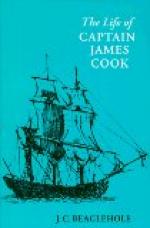Gore, Banks, and three men made a few days’ excursion up the river, but, with the exception of a kangaroo being shot by Gore, the first ever killed by a European, they met with nothing worth noting. On 18th July Cook, Banks, and Solander went up a hill some six or eight miles along the coast to see if they could form any idea of the general run of the coast and the surrounding reefs, and Cook says: “In whatever direction we looked, it [the sea] was covered with shoals as far as the eye could see.”
Before leaving the river, Banks gives some notes as to the country, and puts it down as “in every respect the most barren country we have yet seen.” The animals were not numerous; he gives kangaroo, wolf (the dingo or native dog), bats (flying foxes), wild cats (dasyurus), and opossums. Amongst the birds, several kinds of duck, shags, pelicans, crows, and flock pigeons, all, with the exception of the last, difficult to shoot. Of the crow he says: “A crow in England though in general sufficiently wary is, I must say, a fool to a New Holland crow.” None of the beasts or birds seem to have come amiss to the pot; all that was necessary was the meat should not be salt, “that alone was sufficient to make it a delicacy.” He quotes the description given by a sailor of an animal he saw:
“It was as black as the devil and had wings, indeed I took it for the devil, or I might have catched it, for it crawled away very slowly through the grass.”
After some little trouble Banks discovered this to have been a large bat (flying fox). Of the insect life seen, he was particularly struck by the white ants and their nests, and formed a very respectful opinion of the mosquito.
Cook’s opinion agrees fairly well with that of Banks, but on the whole he thought the east coast was not so barren and desolate as Dampier had described the west coast, and adds:
“We are to consider that we see this country in the pure state of nature; the Industry of Man has had nothing to do with any part of it, and yet we find all such things as Nature hath bestowed upon it, in a flourishing state. In this Extensive Country, it can never be doubted, but what most sorts of grain, Fruit, roots, etc., of every kind would flourish here were they once brought hither, planted and cultivated by the hands of Industry; and here are provender for more cattle, at all seasons of the year, than ever can be brought into the country.”
This is a fair example of the observations and deductions to be found scattered through Cook’s Journals, and an improvement on the would-be scientific and classical rubbish put into his mouth by his editors.
A masthead watch.




